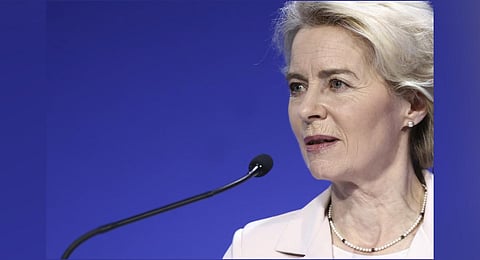

BRUSSELS: The European Union on Wednesday agreed on a new package of sanctions against Russia for its war against Ukraine, including measures aimed at clamping down on evasion of restrictions already in place.
Sweden, which holds the bloc's rotating presidency, said the new measures were approved at a meeting of EU ambassadors in Brussels.
The EU had previously imposed 10 rounds of sanctions on Russia since President Vladimir Putin ordered his forces into Ukraine on Feb. 24, 2022. Banks, companies and markets have been hit, even parts of the sensitive energy sector. More than 1,000 officials are subject to asset freezes and travel bans.
As part of the package, the bloc has put three Hong Kong-based companies on a list of firms to which the EU restricts exports of sensitive technologies, a document seen by AFP showed.
Five companies from mainland China included in an earlier proposal were dropped from the list, a diplomat said after Beijing pushed Brussels to take them off.
But European diplomats concede the bloc has now come close to reaching the limit on broad measures after all EU countries are willing to agree.
Brussels has now turned its attention to closing the loopholes in the sanctions already in place.
European Commission President Ursula von der Leyen, the head of the EU's executive arm, said the new package will “deal a further blow to Putin’s war machine with tightened export restrictions, targeting entities supporting the Kremlin.”
“Our anti-circumvention tool will prevent Russia from getting its hands on sanctioned goods,” she added.
The EU is seeking to crack down on the re-exportation via third countries to Russia of sensitive technology that can be used on the battlefield, such as microchips.
European officials have complained that countries including Turkey, the UAE, and ex-Soviet states in the Caucasus and Central Asia have seen a huge increase in sanctioned goods they import.
Companies in Armenia, Iran, Uzbekistan and the United Arab Emirates are also on the list of those subject to export restrictions.
In a bid to convince third countries to crack down on sensitive tech going to Russia, the EU is establishing a measure that allows it to restrict certain exports to states that don't cooperate.
It is also introducing a ban on ships suspected of receiving secretive transfers of Russian oil out at sea from accessing EU ports.
As part of the latest package, the EU has placed a further 71 individuals and 33 individuals on a visa ban and asset freeze blacklist.
Those include senior Russian military officers, figures linked to the Wagner mercenary group, those involved in mobilising Russian forces and state propagandists.
The latest measures were delayed by weeks of wrangling as Budapest and Athens complained about Ukraine adding Hungarian and Greek firms to a name-and-shame list of companies still doing business in Russia.
(With inputs from AFP and Associated Press)